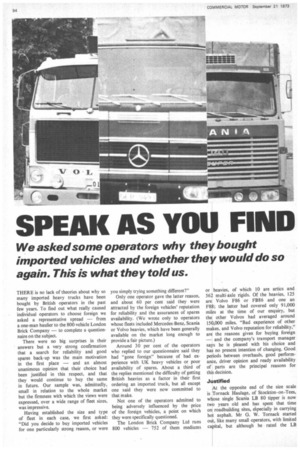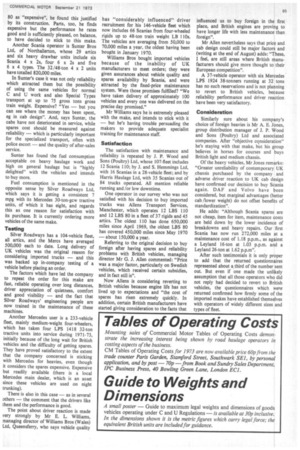We asked some operators why they bought imported vehicles and
Page 96

Page 97

If you've noticed an error in this article please click here to report it so we can fix it.
whether they would do so again. This is what they told us.
THERE is no lack of theories about why so many imported heavy trucks have been bought by British operators in the past few years. To find out what really caused individual operators to choose foreign we asked a representative spread — from a one-man haulier to the 800-vehicle London Brick Company — to complete a questionnaire on the subject.
There were no big surprises in their answers but a very strong confirmation that a search for reliability and good spares back-up was the main motivation in the first place — and an almost unanimous opinion that their choice had been justified in this respect, and that they would continue to buy the same in future. Our sample was, admittedly, small in relation to the whole market but the firmness with which the views were expressed, over a wide range of fleet sizes, was impressive.
Having established the size and type of fleet in each case, we first asked: "Did you decide to buy imported vehicles for one particularly strong reason, or were you simply trying something different?"
Only one operator gave the latter reason, and about 60 per cent said they were attracted by the foreign vehicles' reputation for reliability and the assurances of spares availability. (We wrote only to operators whose fleets included Mercedes-Benz, Scania or Volvo heavies, which have been generally available on the market long enough to provide a fair picture.) Around 30 per cent of the operators who replied to our questionnaire said they had "gone foreign" because of bad experience with UK heavy vehicles or poor availability of spares. About a third of the replies mentioned the difficulty of getting British heavies as a factor in their first ordering an imported truck, but all except one said they were now committed to that make.
Not one of the operators admitted to being adversely influenced by the price of the foreign vehicles, a point on which they were specifically questioned.
The London Brick Company Ltd runs 800 vehicles — 752 of them mediums or heavies, of which 10 are artics and 562 multi-axle rigids. Of the heavies, 125 are Volvo F86 or FB86 and one an E88; the latter had covered only 91,000 miles at the time of our enquiry, but the! other Volvos had averaged around 150,000 miles. "Bad experience of other makes, and Volvo reputation for reliability," are the reasons given for buying foreign — and the company's transport manager says he is pleased with his choice and has no present intention of changing. Good periods between overhauls, good performance, driver opinion and ready availability of parts are the principal reasons for this decision.
Justified At the opposite end of the size scale is Tornack Haulage, of Stocktim-on -Tees, whose single Scania LB 80 tipper is now two years old and has spent that time on roadbuilding sites, especially in carrying hot asphalt. Mr G. W. Tornack started out, like many small operators, with limited capital, but although he rated the LB 80 as "expensive", he found this justified by its construction. Parts, too, he finds expensive but the performance he rates good and is sufficiently pleased, an balance. to have decided to stick to this make.
Another Scania operator is Sunter Bros Ltd, of Northallerton, whose 29 artics and six heavy drawbar units include six Scania 4 x 2s, four 6 x 2s and five 6 x 4 types. The 32/48-ton 4 x 2 units have totalled 820,000 miles.
In Sunter's case it was not only reliability which attracted them but the possibility of using the same vehicles for normal C and U work and also Special Types transport at up to 75 gross tons gross train weight. Expensive? "Yes — but you can see where the money has been spent, eg in cab design". And, says Sunter, the cabs have not deteriorated in service, while spares cost should be measured against reliability — which is particularly important for the specialized transport, often with police escort — and the quality of after-sales service.
Sunter has found the fuel consumption acceptable on heavy haulage work and high on general haulage but is "highly delighted" with the vehicles and intends to buy more.
Fuel consumption is mentioned in the opposite sense by Silver Roadways Ltd, which says it is getting a consistent 7 mpg with its Mercedes 30-ton-ecw tractive units, of which it has eight, and regards this as one reason for satisfaction with its purchase. It is currently ordering more vehicles of the same make.
Testing
Silver Roadways has a 104-vehicle fleet, all artics, and the Mercs have averaged 500,000 each to date. Long delivery of UK vehicles was the original reason for considering imported trucks — and this was backed up in-company testing of a vehicle before placing an order, The factors which have led the company to repeat the order for this make are fast, reliable operating over long distances, driver appreciation of quietness. comfort and good visibility — and the fact that Silver Roadways' engineering people are now trained in the maintenance of these machines, Another Mercedes user is a 233-vehicle fleet, mainly medium-weight four-wheelers, which has taken four LPS 1418 32-ton tractive units into service during 1971-73, initially because of the long wait for British vehicles and the difficulty of getting spares. They have proved satisfactory to the extent that the company concerned is sticking with Mercedes for heavies, even though it considers the spares expensive. Expensive but readily available (there is a local Mercedes main dealer, which is an asset since these vehicles are used on night trunking).
There is also in this case — as in several athers — the comment that the drivers like them and the performance is good.
The point about driver reaction is made very strongly by Mr E. L Williams, managing director of Williams Bros (Wales) Ltd. Queensferry, who says vehicle quality
has "considerably influenced" driver recruitment for his 146-vehicle fleet which now includes 66 Scanias from four-wheeled rigids up to 48-ton train weight LB 110s. The vehicles are averaging from 50,000 to 70,000 miles a year. the oldest having been bought in January 1970.
Williams Bros bought imported vehicles because of the inability of UK manufacturers to meet orders; they were given assurances about vehicle quality and spares availability by Scania, and were attracted by the fixed-price maintenance system. Were those promises fulfilled? "We have taken delivery of approximately 100 vehicles and every one was delivered on the precise day promised."
Mr Williams says he is extremely pleased with the make, and intends to stick with it — but he's having trouble persuading the makers to provide adequate specialist training for maintenance staff.
Satisfaction
The satisfaction with maintenance and reliability is repeated by J. P. Wood and Sons (Poultry) Ltd, whose I07-fleet includes 12 Scania 110; by J. and S. Hemmings Ltd. with 16 Scanias in a 28-vehicle fleet; and by Harris Haulage Ltd. with 35 Scanias out of 84 trucks operated. All mention reliable running and/or low downtime.
One operator in our survey who was not satisfied with his decision to buy imported trucks was Aliens Transport Services, Manchester, which operates 12 LBS 110 and 12 LBS 80 in a fleet of 37 rigids and 45 artics. The oldest 110 has done 650,000 miles since April 1969, the oldest LBS 80 has covered 450,000 miles since May 1970 — about 150.000 a year.
Referring to the original decision to buy foreign after having spares and reliability problems with British vehicles, managing director Mr G. J. Allen commented: "Price was a major factor, particularly on Swedish vehicles, which received certain subsidies, and in fact still is".
Now Allens is considering reverting to British vehicles because engine life has not lived up to expectations and "the cost of spares has risen extremely quickly. In addition, certain British manufacturers have started giving consideration to the facts that influenced us to buy foreign in the first place, and British engines are proving to have longer life with less maintenance than foreign".
Mr Allen nevertheless says that price and cab design could still be major factors and (writing at the end of August) adds: "These, I feel, are still areas where British manufacturers should give more thought to their European competition".
A 37-vehicle operator with six Mercedes LPS 1924 38-tonners running at 32 tons has no such reservations and is not planning to revert to British vehicles, because reliability performance and driver reaction have been very satisfactory.
Consideration
Similarly sure about his company's choice of foreign heavies is Mr A. E. Jones, group distribution manager of J. P. Wood and Sons (Poultry) Ltd and associated companies. After "objective consideration" he's staying with that make, but his group believes in horses for courses and buys British light and medium chassis.
Of the heavy vehicles. Mr Jones remarks: "Greater unreliability of' contemporary UK chassis purchased by the company and adverse driver reaction to UK cab design have confirmed our decision to buy Scania again. DAF and Volvo have been considered, but marginal advantages (better cab /lower weight) do not offset benefits of standardization".
He adds: "Although Scania spares are not cheap. item for item, maintenance costs are held down by the lower incidence of breakdowns and heavy repairs. Our first Scania has now run 272.000 miles at a maintenance cost of 1.18 p.p.m., as against a Leyland 16-ton at 1.03 p.p.m. and a Leyland 26-ton at 1.62 p.p.m".
After such testimonials it is only proper to add that the returned questionnaires represented about a.third of the number sent out. But even if one made the unlikely assumption that all those operators who did not reply had decided to revert to British vehicles, the questionnaires which were returned confirmed how firmly some of the imported makes have established themselves with operators of widely different sizes and types of fleet.
















































































































































































